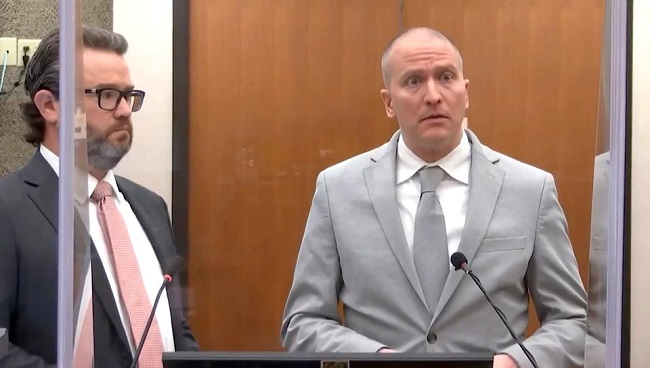Former Minneapolis police officer Derek Chauvin’s attorney argued Wednesday that his client’s three murder convictions for George Floyd should be reversed. The state strongly refuted this claim.
Attorney William Mohrman told a three-judge panel of the Minnesota Court of Appeals that the massive pre-trial publicity prevented Chauvin from receiving a fair trial in 2021 and that a fresh trial is the primary remedy they are seeking.
Why is Derek Chauvin Writing So Much

Mohrman argued that the case could not be tried in Minneapolis because of the extensive media coverage before to trial and the crowds that would have to be accommodated.
In response to the defense’s arguments, Minnesota was represented by former Acting U.S. Solicitor General Neal Katyal, who argued that Chauvin’s trial was “one of the most transparent and exhaustive… in our nation’s history.”
The appeals court’s reasoning “do not come close,” he argued, to supporting a reversal, and even if they did, “the evidence of Chauvin’s guilt was captured on camera for the world to see.”
Mohrman had around five minutes to answer to the judges’ questions and observations after they had each had fifteen minutes to make their opening statements and arguments. The panel has promised to deliver its verdict within 90 days, which would put it around the middle of April.
Read Also:
- What Type of Boating Emergency Causes The Most Fatalities
- Why Did Karen Leave Second Chance Retreat
- Man Attacks Woman At Gardena Gas Station
Whatever Happens, Chauvin will Spend Decades Behind Bars.
Floyd, who was Black, was killed on May 25, 2020, when Chauvin, who is white, attempted to arrest him and forced him to the ground with his knee on his neck for more than 9 minutes.
His shooting death was caught on camera by a bystander and went viral, sparking protests against racism and police brutality in the United States and elsewhere.
In June of 2012, a Hennepin County jury found Chauvin guilty of second-degree murder, third-degree murder, and second-degree manslaughter, and Judge Peter Cahill of that court subsequently handed down a sentence of 22 12 years in state prison.
After a federal judge found Chauvin guilty of violating Floyd’s civil rights, he was given a 21-year jail sentence. All of Chauvin’s time is being served at once in an Arizona federal prison.
In the federal plea deal, he gave up his ability to appeal, so he may only take his case to state court. He faces roughly three years of additional incarceration beyond what a state murder conviction would impose because of variances in parole eligibility between the Minnesota prison system and the federal system.
The Process of Filing the Appeal has been Underway for Some Time.
In September 2021, Chauvin indicated that he would be appealing his conviction and imprisonment, and in April 2022, his attorneys formally submitted the request.
They are pleading with the Minnesota Court of Appeals to overturn his conviction, remand the matter to the county for further proceedings, or grant Chauvin a new trial in a different courtroom.
A number of factors, including extensive media coverage before trial, a $27 million settlement between the city and Floyd’s family (announced during jury selection), unrest over a different police killing in a Minneapolis suburb at the same time, and unprecedented courthouse security, have been cited as problems with the trial.
They are claiming that the court improperly excluded evidence that could have benefited Chauvin’s case, as well as wrongdoing on the part of the prosecutor, witnesses, and the prosecution. The defence team for Chauvin has maintained for a long time that the trial should have been moved.
According to the prosecution, Chauvin was given a fair trial and a just sentence, and they point out that the judge took precautions to assure the selection of impartial jurors and shield them from outside pressures.
Venue and Jury Questions Took Ccentre Stage at the Hearing.
On Wednesday, attorneys presented their cases in front of a judge and jury, fielding questioning and defending their claims in real time. Controversies arose over the use of “cumulative testimony” by the prosecution, the finer points of presumed prejudice, and the legitimacy of the third-degree murder conviction. Much of the debate concerned Juror 52.
After the juror allegedly lied on the jury selection questionnaire when asked whether he had attended any protests against police brutality following Floyd’s death, Chauvin’s team has renewed its call for a Schwartz hearing to investigate the allegations of bias.
A juror failed to disclose that he attended a Martin Luther King, Jr. day march in Washington, D.C., where Floyd’s death was addressed but not the main focus. According to Mohrman, had he given a different response, counsel would have questioned him more before deciding whether or not to seat him.
One panel judge disagreed, noting that the word “protest” was used in the questionnaire instead of “rally,” and that even the defence brief did not treat the two terms interchangeably.
He continued, and Katyal echoed this point in his closing argument, saying that Juror 52 was forthright in all of his other answers, including those about his views on discrimination in the Minneapolis Police Department, Black Lives Matter, law enforcement in general, and his ability to render an impartial verdict.
Katyal argues that it is impossible to prove that Juror 52 “necessarily lied” because he was “as candid as feasible time and time again,” and that the evidence suggests “at most… an honest error.”
Mohrman argued that a Schwarz hearing would be unnecessary if the court sent the case back to the district court for further proceedings.
The Location was Also Spoken About for Some Time.
Because of jurors’ fears for their own safety and the governor’s deployment of the National Guard throughout the city days before the verdict out of concerns for unrest if Chauvin was acquitted, Mohrman claimed the trial should have been moved to another state.
He feels the outcome of the trial might have been different if it had been moved out of Minneapolis, where many of the jurors lived before being selected to serve on the jury. Katyal argued that changing the location of the trial wouldn’t help because “if pre-trial publicity is going to cover the state, then there is no advantage to relocating the site.”
Read Also:
- A Bride Collapsed And Died at Her Wedding
- Flashpoint Of 1992 La Riots Becomes A Place Of Celebration
- NYPD Releases Video of Deranged Man Stabbing Moma Employees …
He said that Cahill had already testified that holding the trial in Hennepin County would be preferable for both safety and jury impartiality because of ongoing fears of civil unrest outside of the city and the increased visibility of security measures.
The panellists were relentless in their questioning of both sides. It may be a time before they issue a judgement, but they were quite clear that they are a “error correcting court” that gives weight to the district court’s discretion, which they characterised as “extremely broad” in many of the issues at hand.





